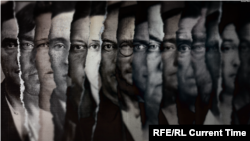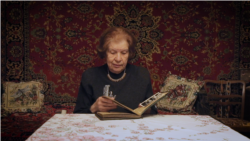Generation Gulag
Generation Gulag
As the Russian government, mainstream media, and educational institutions seek to gloss over the abuses of the Soviet past, the memories of the more than 28 million people who lived through the Soviet Union’s sprawling labor-camp system risk being lost. Generation Gulag, a series of 12 short films made by the media outlet Coda Story, a Current Time content partner, shows the relevance of those memories today for understanding the dangers of authoritarianism.
Using interviews and animated illustrations, the series shares how 12 gulag survivors view the ongoing attempts to airbrush this chapter out of Soviet history, and what risks such a practice contains.
Coda Story is an award-winning, non-profit newsroom, based in Tbilisi, Georgia, that offers in-depth, narrative-driven coverage of global crises. Its current coverage focuses on disinformation, technology’s threats to democracy, the war on science, and oligarchs' response to the COVID-19 pandemic.
Schedule: Watch the program online on Current Time.Doc's YouTube channel.
Subtitled Episodes:
Episode 12: Music In The Siberian Gulag: Yuris Enkovick
On June 2, 1941, the Soviet regime deported to Siberia over 15,000 Latvians, relatives of so-called "enemies of the people." More than 200 people died in the very first winter. The father of Yuris Yankevich was arrested in front of his three-year-old son, and later brutally murdered.

Episode 11: The Latvians Deported By Stalin To Siberia: Andrys Ziders
The last time Andrys Ziders saw his father was June 14, 1941. Ziders and his family were among roughly 15,000 Latvians deported to Siberia after thousands of Latvian men were executed by Soviet troops; the most likely fate of his father.
Episode 10: A Square Covered With Blood | Anatoly Zhmurin
In 1962, Anatoly Zhmurin accidentally found himself in the epicenter of a violent crackdown on a workers' demonstration in the industrial city of Novocherkassk, .He was shot, crawled away, and escaped arrest. For 30 years, he did not tell anyone that he had been injured.
Episode 9: A Ticket To Freedom: Tatiana Kolomeitseva
Tatiana Kolomeitseva's mother was imprisoned for 10 years for a handful of millet stolen from a collective farm field during a post-war famine. And in prison, she most likely became pregnant to receive an amnesty.

Episode 8: Returned To The USSR, Sent To The Gulag
In the post-war period, Soviet recruiters traveled the world tracking down former citizens of the Russian empire or those who fled during the war. Liliane Jean-Monnet's father was among the thousands who took the bait. He moved his wife and French-born children to the "communist paradise" in 1947 — a choice the family bitterly regrets to this day.

Episode 7: Deported From Crimea: Zeinep Osmanova
As a child, Zeinep Osmanova was among more than 190,000 Crimean Tatars thrown into cattle cars and shipped off to the Urals in 1944, on Stalin's orders. At the age of 10, she began work cutting down trees. She always remembered her homeland, but would not see it again for nearly 50 years.

Episode 6: Pregnant In The Gulag: Vera Golubeva
Stalin's purge of the Communist Party left hardly a single family untouched in Moscow in the 1930s. Vera Golubeva clearly remembers the night her father was arrested. Her mother and sister's arrests followed, until Golubeva herself was taken by the secret police when she was eight months pregnant.

Episode 5: Love At First Sight: Galina Nelidova
One moment between Galina Nelidova and a young Norwegian man changed her life forever. She would never see him again, but the connection led to months of interrogation and torture by the KGB, and to five years in a labor camp.

Episode 4: Betraying The Motherland: Valentina Vodyanitskaya
Valentina Vodyanitskaya has kept much of her life a secret. That was the direct command she was given by the KGB. The five years she spent in a labor camp — a secret. The 1962 demonstrations during which she was arrested — a secret. The grave sites of those killed by Soviet troops during the demonstrations — a secret.

Episode 3: An Officer's Daughter: Olga Shirokaya
Olga Shirokaya knew her arrest was inevitable. She watched as Stalin eliminated his inner circle, including her father. Then, while her university class watched, the secret police arrested Shirokaya. All these years later, when she thinks about whom is to blame, she remembers a nation where millions lived in fear, but also where millions participated in the system of terror.

Episode 2: The Historian: Irina Verblovskaya
Historian, writer, and radio host Irina Verblovskaya began her married life with an arrest. In 1957, her husband, mathematician Revolt Pimenov, and she were both arrested after writing and dispatching, respectively, letters to the Soviet Supreme Council that protested the Soviet Union’s suppression of Hungary’s 1956 anti-communist uprising.

Episode 1: The Dancer: Azari Plisetsky
Born in a special Gulag camp for the wives and families of the men arrested by Stalin, Azari Plisetsky is one of the thousands who grew up fatherless after Stalin's purge of the Communist Party in the late 1930s. Ballet was an escape for the Plisetsky children — Maya, Azari, and Aleksandr — who became some of the Soviet Union's most celebrated dancers. For 82-year-old Azari Plisetsky, the memory of the cruelty of Soviet authoritarianism has never faded.
About The Producer
Katerina Patin is a multimedia journalist for the non-profit media outlet Coda Story, based in Tbilisi, Georgia. Patin covers both disinformation and authoritarian uses of technology. Her work has appeared in The Guardian, Haaretz, NBC, Radio Free Europe/Radio Liberty, Rappler, and VICE News.






